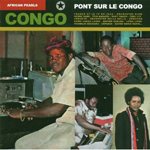|
|
 |
Dusted Reviews
Artist: V/A Album: African Pearls: Congo - Pont Sur Le Congo Label: Syllart Review date: May. 24, 2010 |

|
|
|
 |
Analog Africa and Soundway Records have been getting a lot of attention with their user-friendly presentation of vintage popular music from previously ignored corners of Africa, but they’re upstarts. Ibrahima Sylla, a record producer and businessman who was born in the Ivory Coast, has been selling popular music in Western Africa and around the world for decades. That means he’s been involved with the good, bad and ugly sides of World Music marketing. On the downside, he’s brought lots of musicians into posh Paris studios over the years to encase their sounds in a deplorable, rapidly dated plastic sheen. But he also has access to an enormous reservoir of great vintage music from around the Central and Western parts of the continent, which has been cherry-picked for nationally themed African Pearls compilations.
Pont Sur Le Congo surveys the music from two Central African nations that sit on either side of the Congo River; one is currently know as the Democratic Republic of Congo (previously known as the Congo Free State, Belgian Congo, Zaire, and Congo-Kinshasa) and the other is the much smaller Republic of Congo (aka Congo-Brazzaville). The 1960s and ’70s, the era covered by this set, were a great time for these two countries, both of which have been laid low by military conflict and kleptocratic goverment. Their colonial masters (Belgium and France) had relinquished control, their economies were growing, and the growing urban populations had growing access to modern pleasures like electricity and Western pop music. Which isn’t to say that sounds from outside Africa were new; this neck of the world had already been plugged into international trade routes for 400 years, and Cuban music, in particular, had held sway for decades. But the proliferation of resources and the assertion of a common Congolese identity spurred an efflorescence of home-grown music characterized by ringing, repetitive lead guitars, punchy horn punctuation, easy-swaying poly-rhythmic grooves, and Cuban-influenced vocal melodies known variously as rumba, soukous, and African jazz. The Caribbean elements are especially noteworthy because singers like Franco, Tabu Ley, and L’Orchestre Bella Bella’s Soki Bros. were more likely to sing in Lingala, French or Kikongo. But just as it doesn’t take much rum to spike a drink, a bit of Cuban melody can dominate the flavor of a tune, and those sinuous lines, often buffered by studio reverb, are among the elements that make it easy for an American living in another century who doesn’t understand a word they’re singing to like this music.
Another is the guitar playing. Generally liquid and lyrical, it’s instantly ingratiating. If you mainly know Congolese music from the amped-up thumb pianos of Konono No. 1, you’ll recognize their figures in the cleaner but quite propulsive picking heard on Orchestre Kiam’s “”Kamiki” and Orchestre Bella Bella’s “Sola.” But you’ll also hear hints of North American soul in Franklin Boukaka’s “Nakoko,” which sounds like it was recorded after some intensive listening to Muscle Shoals and Memphis session work, and Docteur Nico ties up his sweet singing on “Canchita” with country & Western-style steel guitar.
There isn’t a bum tune amongst the 24 collected on this double CD, and the packaging includes high-quality color reproductions of old record sleeves. The liner notes, rendered in both French and English, suffer a bit from indifferent translation, although if you feel like digging the facts and anecdotes are there. Their opacity is the biggest obstacle to Pont Sur Le Congo finding the same sort of favor as Legends of Benin or the Nigeria Special series.
By Bill Meyer
|







